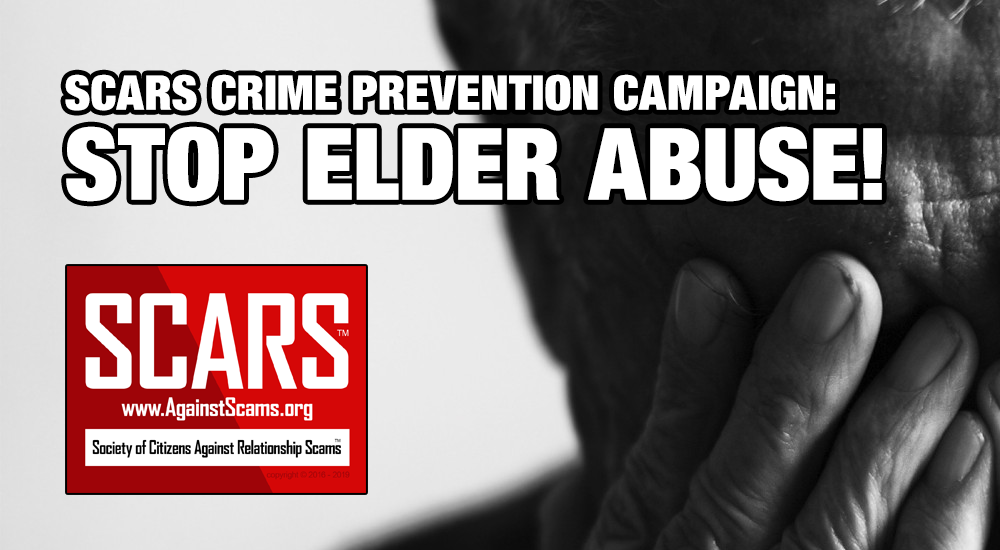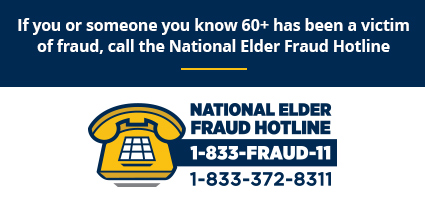SCARS™ Crime Prevention Campaign: Stop Elder Abuse!
World Elder Abuse Awareness Day was this month. But before it passes let’s focus on stopping this depravity!
Join SCARS, the Department of Justice’s Office for Victims of Crimes, the National Crime Prevention Council, and others in acknowledging World Elder Abuse Awareness this June. This annual event is a call-to-action for individuals, organizations, and communities to raise awareness about elder abuse, neglect, and financial exploitation.
To acknowledge this need we reaffirm our commitment to supporting victims of elder abuse.
STATEMENT FROM THE U.S. DEPARTMENT OF JUSTICE:
Combatting elder abuse and financial fraud targeted at seniors is a key priority of the Department of Justice. Elder abuse is an intentional or negligent act by any person that causes harm or a serious risk of harm to an older adult. It is a term used to describe five subtypes of elder abuse: physical abuse, financial fraud, scams and exploitation, caregiver neglect and abandonment, psychological abuse, and sexual abuse. Elder abuse is a serious crime against some of our nation’s most vulnerable citizens, affecting at least 10% of older Americans every year. Together with our federal, state, local and tribal partners, the Department of Justice is steadfastly committed to combatting all forms of elder abuse and financial exploitation through enforcement actions, training and resources, research, victim services, and public awareness. This holistic and robust response demonstrates the Department’s unwavering dedication to fighting for justice for older Americans.
Help OVC Connect Victims of Elder Fraud with Support
In March, the U.S. Department of Justice launched the National Elder Fraud Hotline, operated by OVC, that provides services to adults ages 60 and older who may be victims of financial fraud.
The Hotline is staffed by experienced case managers who provide personalized support to callers by assessing the needs of the victim and identifying relevant next steps. Case managers can assist callers with reporting the suspected fraud to relevant agencies and provide resources and referrals to other appropriate services as needed.
For more information, read an Office of Justice Programs blog on the National Elder Fraud Hotline.
New OVC-Funded Elder Abuse Materials
The following OVC-funded publications and videos are the result of awards made to the FY 2017 Field-Generated Innovations in Addressing Elder Abuse and Financial Exploitation program to build the capacity of victim service providers and allied professionals in the support of victims of elder abuse and financial exploitation.
Elder Abuse Fatality Review Teams: A Replication Manual
Elder abuse fatality review teams review deaths caused by or related to elder abuse and can improve the response of community agencies to elder abuse victims. This publication provides guidance to communities interested in establishing similar teams. This updated resource includes information on the criteria and selection of cases for review, confidentiality practices, preventing “blame and shame,” and a comparison of 27 categories of professionals serving as team members.
Lifting up the Voices of Older Survivors
This series of nine training videos feature older Americans sharing their experiences with intimate partner violence, financial exploitation, sexual assault/abuse, and stalking. The stories highlight the impact of elder abuse on victims and their families and suggest effective interventions. Discussion guides accompany each video.
STAGES (Strategies and Training to Advance Greater Elder Safety) Curriculum
The STAGES of curriculum educates teams of judicial, justice, and community professionals about financial exploitation and elder abuse.
Elder Law Risk Detector
This online tool is designed to help civil legal professionals identify their client’s risk factors for financial exploitation.
National Referral System Effective Referrals at the Community Level with Person-Enhanced Technology
Elder Law of Michigan, Inc. developed this framework for a national referral system based on a community-level referral model used in Michigan for victimized and vulnerable older adults.
Find more resources on the Elder Abuse/Mistreatment section of our site, the U.S. Department of Justice’s Elder Justice Initiative site, and the Elder Abuse Special Feature section of the National Criminal Justice Reference Service site.
National Hotline Helps Victims of Elder Financial Fraud – Background
Attorney General William P. Barr announced earlier this spring the opening of the National Elder Fraud Hotline 1-833-FRAUD-11, a recent tool in the Department of Justice’s ongoing strategy to bring to justice those who seek to defraud older Americans. The Office of Justice Programs’ Office for Victims of Crime manages the hotline, which since its opening on March 3 has received over 1,800 calls.
One caller received a computer pop-up that said she needed to secure her account. After providing her financial information, the scammer took at least $30,000. Another called to report that he lost $200,000 over four years to someone who had deceived him into thinking she was his girlfriend. And a third was still waiting for a contractor to come through on a roof repair—for which the caller had paid months earlier.
These callers represent only a few victims of deceptions that often target our seniors. The Justice Department estimates that financial exploitation, the most common form of elder abuse, afflicts one in ten seniors.
According to the “2018 DOJ Report on Elder Abuse and Financial Exploitation,” each year an estimated $3 billion is stolen from America’s seniors through a variety of mass mailing, romance, and vendor or contractor scams. They may also fall prey to imposters who claim to represent the IRS, Medicare or Medicaid, or Social Security.
From 2013 to 2017, financial scams and other crimes that focus on older Americans quadrupled, according to a report by the Consumer Financial Protection Bureau. The advent and growth of the Internet and other technology have made them especially vulnerable. These crimes are particularly heartless, because victims may lose their life savings and usually do not have the time or opportunity, or resources or technological savvy, to recover from financial loss. The Justice Department expects the problem only to increase as our country’s older population continues to grow.
The National Elder Fraud Hotline serves all adults ages 60 and older seven days a week. Reporting financial losses from some types of fraud as soon as possible—even within three days—can increase the likelihood of recovering them. Reporting is essential because it is the first step in connecting the victim to authorities and can help identify those who commit fraud—preventing additional victims.
Upon receiving a call, a trained customer advocate assesses the need and provides resources, or connects the caller to an experienced case manager. The case manager identifies the appropriate reporting agency, such as local law enforcement, Adult Protective Services, or a bank, and assists in making the report. As needed, the case manager provides resources and referrals and can complete a complaint form with the FBI or Federal Trade Commission.
Many schemes that target American seniors are carried out by foreign-based entities. To investigate and prosecute these crimes, the Department established the Transnational Elder Strike Force, which President Trump’s Executive Order called for in July 2018. A National Elder Abuse Coordinator was appointed, and a prosecutor in each of the 94 U.S. Attorney’s Offices focuses on these crimes in the district.
In addition to the hotline, OJP’s Office for Victims of Crime supports those exploited by fraud through funding to private organizations, and tribal, local and state government agencies. Today, OJP announced the awarding of nearly $2 million for law enforcement training and technical assistance to help elder fraud victims and connect them to available resources. The National White Collar Crime Center will receive $1,940,738 to work with the International Association of Chiefs of Police to identify current training, tools and practices used to address elder fraud.
OVC anticipates awarding another $6 million to enhance services available for those recovering from these crimes. These funds boost its largest share of grant funding, which provides numerous services to crime victims through the Victims of Crime Act. In Fiscal Year 2019, more than 5,500 organizations nationwide served more than 357,000 individuals who were age 60 or older.
OJP is committed to helping the victims of elder abuse. We want to do all we can to ensure that our seniors enjoy their golden years with a sense of security, peace of mind, and the support of those they love.
Summary
If you or someone you know is being abused these are resources you can trust.
We are here to help and educate seniors about the risks of scams online, but there are far greater risks and these resources can help you bring it to an end.
National Elder Fraud Hotline
Click To Call: 1-833-372-8311
NOTE: SCARS is registered with the U.S. Department of Justice’s Office for Victims of Crime through their National Census of Crime Victims’ Assistance Providers
TAGS: SCARS, Important Article, Information About Scams, Anti-Scam, Scams, Scammers, Fraudsters, Cybercrime, Crybercriminals, Romance Scams, Scam Victims, Elder Abuse, Elder Fraud Hotline, President Trump, Executive Order, Justice Department, Senior Citizens, Elder Victims, Supporting Seniors
SCARS™ Team
Society of Citizens Against Relationship Scams Inc.
A Worldwide Crime Victims Assistance Nonprofit Organization
Visit: www.AgainstScams.org
Contact Us: Contact@AgainstScams.org
PLEASE SHARE OUR ARTICLES WITH YOUR FRIENDS & FAMILY
HELP OTHERS STAY SAFE ONLINE – YOUR KNOWLEDGE CAN MAKE THE DIFFERENCE!
The Latest SCARS Posts:
FIND MORE SCAM NEWS
«SCAMCRIME.COM»
JOIN US ON FACEBOOK
«CLICK HERE»
END
MORE INFORMATION
– – –
Tell us about your experiences with Romance Scammers in our
« Scams Discussion Forum on Facebook »
– – –
FAQ: How Do You Properly Report Scammers?
It is essential that law enforcement knows about scams & scammers, even though there is nothing (in most cases) that they can do.
Always report scams involving money lost or where you received money to:
- Local Police – ask them to take an “informational” police report – say you need it for your insurance
- U.S. State Police (if you live in the U.S.) – they will take the matter more seriously and provide you with more help than local police
- Your National Police or FBI « www.IC3.gov »
- The SCARS|CDN™ Cybercriminal Data Network – Worldwide Reporting Network on « www.Anyscam.com »
This helps your government understand the problem, and allows law enforcement to add scammers on watch lists worldwide.
– – –
To learn more about SCARS visit « www.AgainstScams.org »
Please be sure to report all scammers
on « www.Anyscam.com »
Disclaimer:
SCARS IS A DIGITAL PUBLISHER AND DOES NOT OFFER HEALTH OR MEDICAL ADVICE, LEGAL ADVICE, FINANCIAL ADVICE, OR SERVICES THAT SCARS IS NOT LICENSED OR REGISTERED TO PERFORM.
IF YOU’RE FACING A MEDICAL EMERGENCY, CALL YOUR LOCAL EMERGENCY SERVICES IMMEDIATELY, OR VISIT THE NEAREST EMERGENCY ROOM OR URGENT CARE CENTER. YOU SHOULD CONSULT YOUR HEALTHCARE PROVIDER BEFORE FOLLOWING ANY MEDICALLY RELATED INFORMATION PRESENTED ON OUR PAGES.
ALWAYS CONSULT A LICENSED ATTORNEY FOR ANY ADVICE REGARDING LEGAL MATTERS.
A LICENSED FINANCIAL OR TAX PROFESSIONAL SHOULD BE CONSULTED BEFORE ACTING ON ANY INFORMATION RELATING TO YOUR PERSONAL FINANCES OR TAX RELATED ISSUES AND INFORMATION.
This content and other material contained on the website, apps, newsletter, and products (“Content”), is general in nature and for informational purposes only and does not constitute medical, legal, or financial advice; the Content is not intended to be a substitute for licensed or regulated professional advice. Always consult your doctor or other qualified healthcare provider, lawyer, financial, or tax professional with any questions you may have regarding the educational information contained herein. SCARS makes no guarantees about the efficacy of information described on or in SCARS’ Content. The information contained is subject to change and is not intended to cover all possible situations or effects. SCARS does not recommend or endorse any specific professional or care provider, product, service, or other information that may be mentioned in SCARS’ websites, apps, and Content unless explicitly identified as such.
The disclaimers herein are provided on this page for ease of reference. These disclaimers supplement and are a part of SCARS’ website’s Terms of Use.
Legal Notices:
All original content is Copyright © 1991 – 2020 Society of Citizens Against Relationship Scams Inc. (D.B.A SCARS) All Rights Reserved Worldwide & Webwide. Third-party copyrights acknowledge.
SCARS, SCARS|INTERNATIONAL, SCARS, SCARS|SUPPORT, SCARS, RSN, Romance Scams Now, SCARS|INTERNATION, SCARS|WORLDWIDE, SCARS|GLOBAL, SCARS, Society of Citizens Against Relationship Scams, Society of Citizens Against Romance Scams, SCARS|ANYSCAM, Project Anyscam, Anyscam, SCARS|GOFCH, GOFCH, SCARS|CHINA, SCARS|CDN, SCARS|UK, SCARS|LATINOAMERICA, SCARS|MEMBER, SCARS|VOLUNTEER, SCARS Cybercriminal Data Network, Cobalt Alert, Scam Victims Support Group, are all trademarks of Society of Citizens Against Relationship Scams Inc., All Rights Reserved Worldwide
Contact the law firm for the Society of Citizens Against Relationship Scams Incorporated by email at legal@AgainstScams.org













Leave A Comment